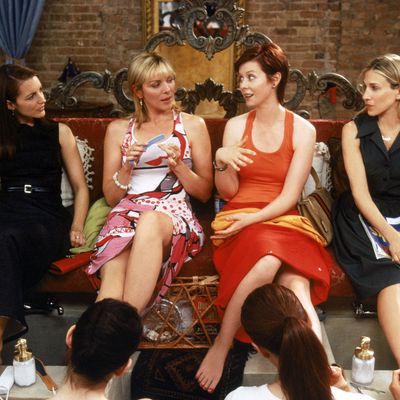
Heard enough about Difficult Men, the recently published history of shows about (and made by) complicated genius-men that elevated the medium of television forever? This week New Yorker television critic Emily Nussbaum used the book as an occasion to burnish the reputation of the four easy, though often unlikable, women of Sex and the City.
After the series’ cop-out finale (in a convenient surprise, Aleksandr Petrovsky turns out to be physically abusive, allowing the merely emotionally abusive Mr. Big to come to Carrie’s rescue) and decadent, mid-recession big-screen follow-ups, Sex and the City was critically denigrated, Nussbaum explains. As a result, we tend to forget the complex allegories about women’s emotional, ideological, and sexual lives that were present in SATC (and are mapped out by Nussbaum). Instead, we pat the series on the head for the “rawness of its subject matter,” which allowed women to talk “more explicitly about their bodies,” and for opening the door for more shows about women.
On the one hand, it worked. Since Sex and the City, there’s no shortage of shows about sexually active women. But the women of premium cable face new, different limitations. As Heather Havrilesky wrote in The New York Times Magazine, if a Difficult Woman carries a prestige show, her difficulty is now often medically justified: Homeland’s Carrie Mathison is bipolar; Enlightened’s Amy Jellicoe suffered a nervous breakdown; The United States of Tara’s heroine had multiple-personality disorder. It’s as if there’d have to be something wrong with a woman for her to be as passionate or volatile or cruel as Don Draper or Stringer Bell were by nature. The objectionable qualities of TV’s antiheroes fall along the same gender stereotypes as ex-lovers: He was an asshole; she was crazy. Tony Soprano was remarkable for transcending the binary (he was in therapy, but his panic attacks were existentially justified), but Carrie Mathison has much more in common with him than with Carrie Bradshaw. A run-of-the-mill egotist with a sex column, Bradshaw didn’t have to be a certified narcissist to be compellingly monstrous at times.
Really, what seems to have never really recovered from the critical backlash against Sex and the City is its supposedly celebrated “raw” subject matter: sex, relationships, social status. No matter how brilliant, a woman who writes about these topics can’t expect to be taken as seriously as men or women writing about different topics (including mental illness). Nussbaum writes:
Why is the show so often portrayed as a set of empty, static cartoons, an embarrassment to womankind? It’s a classic misunderstanding, I think, stemming from an unexamined hierarchy: the assumption that anything stylized (or formulaic, or pleasurable, or funny, or feminine, or explicit about sex rather than about violence, or made collaboratively) must be inferior.
At the heart of the divergent legacies of The Sopranos and Sex and the City (which Nussbaum says “wrestled with the limits” of the “pink-tinted” romantic-comedy genre in the beginning, as much as The Sopranos messed with macho genres) is the same debate currently under way about women’s magazines and literary fiction. Last month, The New Republic asked why women’s magazines don’t do serious journalism, not why we don’t take the forms of journalism (personal narrative, service) or subjects (sex, health, relationships) women’s magazines already do seriously.
In the case of television, you could argue that the world doesn’t need more shows about the concerns of white, wealthy women — and, after the first season of Sex and the City heir Girls, plenty of people did make this argument. (Which might be unfair in itself; I don’t remember anyone saying that there were too many white guys on Entourage.) For her part, Lena Dunham seems more interested in the earlier show’s legacy of frank sexuality than in the feminist debates (masquerading as brunches) that Nussbaum admires. But evidently, explicit sex is no longer sufficient justification for a wealthy white woman — especially a difficult one — to talk about her problems. In the show’s second season, Dunham diagnosed her heroine with OCD.








